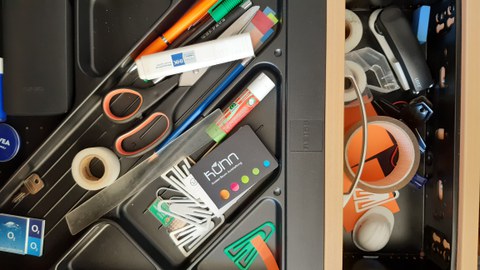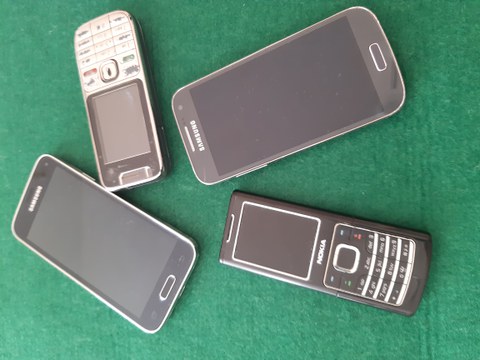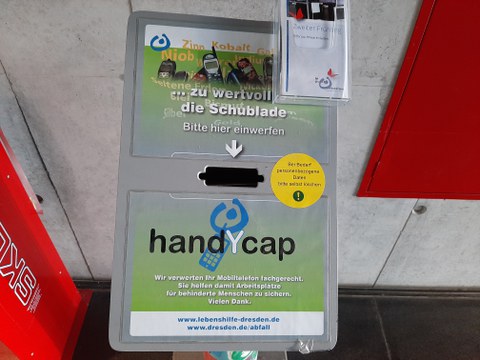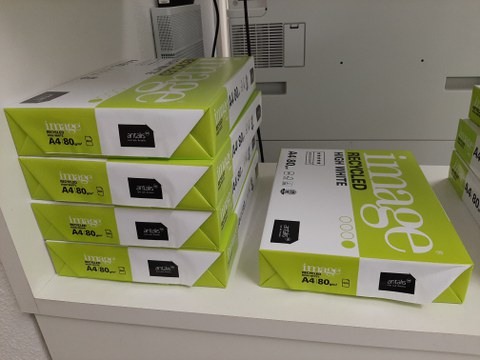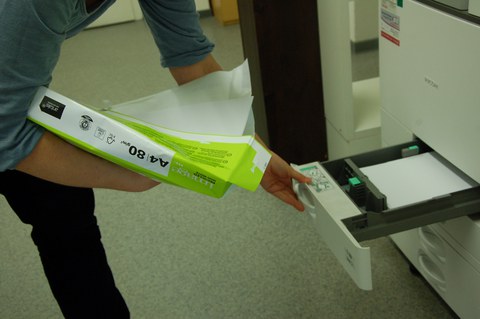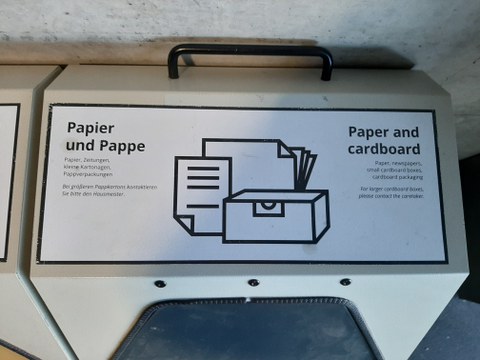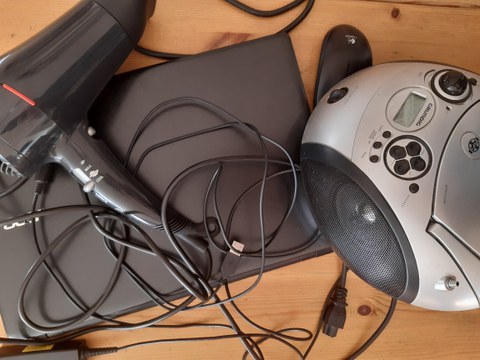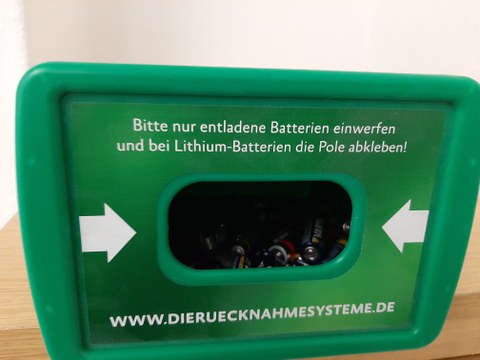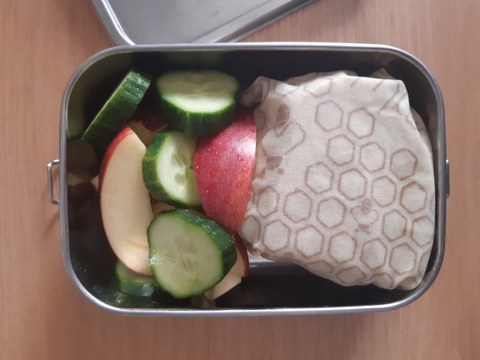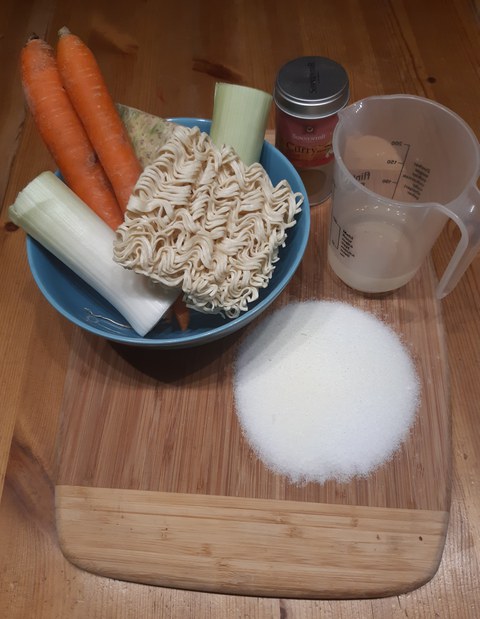Join in! - Tips for Waste Reduction
Every year the European Waste Prevention Week takes place. Thousands of public actions across Europe show alternatives to the throwaway society and waste of resources. The TU Dresden also took part in the campaign in 2020. Due to the restrictions imposed by Covid-19, a campaign was started via Instagram and Facbook, in which daily tips for everyday university life or for at home on the subject of waste prevention were posted from November 23rd to 27th. The five tips are now still available after the campaign week:
Tip 1: Don't throw away, but pass on!
Tip 2: Use smartphones as long as possible and dispose of old smartphones correctly!
Tip 3: Reduce paper consumption! Use recycled paper! Dispose of paper correctly!
Tip 4: Dispose of electronic waste correctly! Collect batteries! Repair instead of disposal!
Tip 5: Waste avoidance: From home to university!
Tip 1: Don't throw away, but pass on!
The best way to reduce waste is by not creating it in the first place. In offices, workshops and laboratories, many objects that are still functional and materials that are still usable are thrown away every year. Some items that are no longer needed are stored in drawers for years, only to be sorted out at some point during a general cleaning. For all these objects there is now an online office supply exchange at the TU Dresden. Employees and students of the TU Dresden can post and exchange office supplies via the platform.
Link: https://tu-dresden.de/intern/arbeitsschutz-gesundheit-umwelt/umweltschutz-und-umweltmanagement/mach-mit-bueroartikeltauschboerse
Larger used items, e.g. office furniture, tables, chairs, monitors, slide projectors etc. are offered by the TU Dresden's temporary storage facility. Here no longer used inventory of the TU Dresden is available.
In addition, the city of Dresden offers an online exchange and gift market: https://www.verschenkmarkt-dresden.de/
Tip 2: Use smartphones as long as possible and dispose of old smartphones correctly
Numerous valuable and rare resources are contained in our smartphones. The raw materials are often obtained by means of massive environmental destruction under inhumane working conditions. Production and disposal are also harmful to the climate. Therefore our tip: Use, pass on and repair your own device as long as possible.
It is also important to dispose of old smartphones correctly: Rare metals can be recovered in this way. The TU Dresden is participating in the city-wide HandyCap cell phone collection campaign. Cell phone collection points are located in the Stura-Barracke, in the entrance area of the Chemistry building (CHE) and in front of the Mensa Siedepunkt in the BZW. There, used cell phones and smartphones can be thrown in. Please make sure to remove the rechargeable batteries beforehand!
Tip 3: Reduce paper consumption! Use recycled paper! Dispose of paper correctly!
Reduce paper consumption!
- Ask yourself: Is it really necessary to print the document?
- Rethink workflows, filing systems and paper-based forwarding in your own workspace.
- Check requirements before print jobs are submitted.
- Print only required pages/slides and not the entire document.
- Double-sided (duplex) and print multiple pages/foils on one side.
- Print black and white or with little color.
- Minimize the number of pages, e.g. through simple language, smaller font size or reduction of graphics and images to the essential.
- Support digitization, e.g. by using the digital signature, offering digital scripts & exercises, using a graphics tablet or laptop for taking notes.
Use recycled paper!
- Recycled paper with the „blauer Engel“ (Blue Angel) preserves wood resources and consumes approx. 70% less water and 60% less energy during production than normal paper.
- Recycled paper is available at the TU Dresden at the online store for office and business supplies.
- Recycled paper is already available in some copy stores on campus.
Dispose of paper correctly!
Paper should be collected and disposed of separately so that it can be used as a raw material for recycled paper. The waste paper baskets in the offices are for paper only. - On the corridors of the TU Dresden there are sets of three for proper waste separation (paper / packaging / residual waste).
Tip 4: Dispose of electronic waste correctly! Collect batteries! Repair instead of disposal!
Dispose of electronic waste correctly!
Only if electronic waste is collected separately the reuse of many of the valuable substances contained in electronic devices is possible. The devices are shredded in recycling plants and the ingredients are sorted. Only in this way can at least larger parts, such as the steel housing of a PC, the copper cable or the iron magnets from loudspeakers, be recycled. In Dresden, some old appliances are dismantled in workshops for the disabled run by the Lebenshilfe e. V. association and sent for recycling or environmentally friendly disposal. In this way, the city supports the work of the association and thus secures around 60 jobs for disabled people. If you have to dispose of electronic waste, please contact: . Private households should make sure that even small objects such as rubber balls with lights or "signal-sneakers" are electronic scrap. If you cannot refrain from buying these items at least dispose of them correctly – they belong to electronic waste - just like the refrigerator or the old television set.
Collect batteries!
Batteries and accumulators must be collected separately. They contain heavy metals like mercury, cadmium or lead. If these components reach the groundwater via household waste or disposal in nature, not only the environment suffers, but also the quality of our drinking water. Furthermore, batteries contain valuable raw materials such as iron, zinc, nickel, manganese and silver. Such valuable materials cannot be recycled with household waste, but are lost in landfills and incinerators. Therefore, many buildings at TU Dresden have battery collection boxes. These are emptied regularly and are passed on centrally for battery recycling. Private households can dispose of their batteries and accumulators in supermarkets, department stores, electronic stores or gas stations.
Repair instead of disposal!
It is important to take a close look at the devices. Often electronic devices can be repaired. In Dresden there is an initiative that offers repair cafes. Everybody can repair defective items with assistance in a kind of temporary self-help workshop. Dates for the RepairCafes, which are currently held online, as well as tips for repairing can be found at https://repaircafe.fueralle.org/ or on Facebook.
Tip 5: Waste avoidance: From home to university!
Every day we bring our waste to the university. The bag for bread rolls, the disposable coffee cup from the baker at the train station, the plastic wrapping from our lunch - whether warm or cold -, the disposable drink bottle because we were suddenly so thirsty.... Here are a few tips on how to avoid waste in these situations:
Use beeswax tissues for bread!
Aluminium and cling film are among the particularly short-lived materials in the kitchen. You can easily replace them with reusable cloths made of cotton and beeswax. You can buy them in drugstores or organic markets. These practical kitchen gadgets can also be made from leftover fabric with little effort, as explained here: https://www.smarticular.net/oekologische-frischhaltefolie-ohne-plastik-selbermachen/
Bring your home-cooked lunch!
Home-cooked food is mostly healthier and cheaper than food-to-go. If you can't heat your food, you can use thermal containers, for example. Meanwhile there are countless variations of these and also nice lunch boxes to buy. In a screwed glass, food can also be taken along well.
Do it yourself! - Asia Snack
Small Asian snacks are very popular for breaks - but unfortunately they also come with a lot of packaging material and the list of ingredients is very long! Can't you do it yourself? You can! The search on the internet yields countless hits. An easy way is to make vegetable paste in stock. The rough rule: For every 400 g of vegetables, add some 100 g of salt (4:1) to preserve and some oil. Pureed and filled into clean screw glasses, the paste can be kept in the refrigerator for a long time. For one portion of Asian noodles, the instant noodles, a heaped teaspoon of seasoning paste and some curry powder, pour 250 ml of boiling water over it and let it soak covered for about 5 minutes - done! If you like, you can also add peas from the freezer or roast leftovers. Detailed recipes for a vegetable paste and for an Asian spice paste for instant noodles can be found under the following links
https://www.smarticular.net/haltbare-gemuese-wuerzpaste-selbermachen-ohne-kochen/
https://www.smarticular.net/asia-wuerzpaste-instant-nudelsuppe-selber-machen-rezept/
More tips:
- Mix breakfast cereal yoghurt at home and take it with you.
- In the cafeteria, say STOP! if the portion is too large.
- Drink coffee in returnable cups or drink it on the spot.
- Drink tap water! Bring a water bottle to refill.
- Take a container with you to the snack bar or soup store instead of using one-way packaging
....Who has more tips? We can expand the list together!
Many helpful tips on sustainability in everyday life can be found on this page: https://www.smarticular.net/
 © M. Kretzschmar
© M. Kretzschmar
Environmental Coordinator
NameDr. Ines Herr
Send encrypted email via the SecureMail portal (for TUD external users only).

